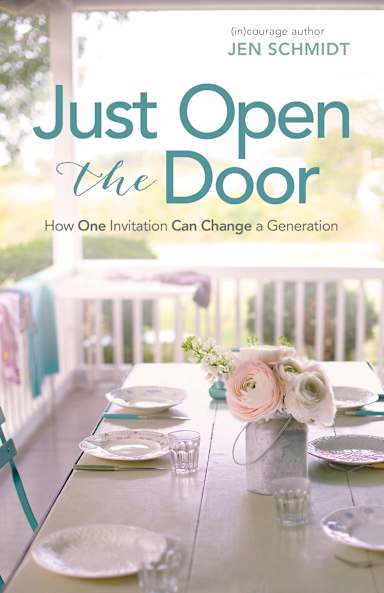Hospitality. What is it, really? When we overstress, overplan, and overthink inviting others into our lives and homes, hospitality becomes overwhelming to our souls. We become slaves to the expectations of others. We freeze at the mere thought of extending an invitation. Craving both perfection and polished perception, we fall victim to a cruel taskmaster. So how do we find the balance here? How do we open our door to the unknown without opening ourselves to dread and discouragement?
It comes down to knowing the difference between entertaining and hospitality.
In her flagship book Entertaining, Martha Stewart says, "Entertaining, like cooking, is a little selfish, because it really involves pleasing yourself with a guest list that will coalesce into your ideal of harmony, with a menu orchestrated to your home and taste, with decorations subject to your own eye. Given these considerations, it has to be pleasureful."1
This one paragraph hints at the telltale difference. It all rests on this dichotomy.
The entertaining host seeks to elevate herself. And as Martha mentions, it's a bit selfish. When the guest arrives, the entertainer announces, "Here I am. Come into my beautiful abode and have the honor of partaking of all the wonderful things I've spent hours getting done for you. Look at this lavish buffet, the intricate décor, and the wonderful party favors. How fortunate for you to be here and be part of this." While I embellish on what a hostess might actually say, we've all encountered this attitude once or twice, haven't we? Maybe we've even allowed a similar tone to slip ever so subtly into our own hosting. But when you leave the entertaining host's house, how do you feel? Remember that, and do the opposite.
Hospitality is different. Biblical hospitality offers our best to Him first, understanding that our best to others will then fall into place. It transforms our selfish motives and elevates our guest. When the hospitable hostess swings wide the door, all her attention focuses outward: "You're here! I've been waiting for you. No one is more important today than you, and I'm thrilled you've come." The posture we assume in hospitality is one that bends low, generously offering our heart to another despite whatever interruption to our own plans or comfort. Extending hospitality is about freely giving of ourselves while granting others the freedom to be themselves. Shifting our focus from us to them removes all unnecessary expectations. No need to worry about what to say or how to act. Just come as you are.
Every day they devoted themselves to meeting together in the temple, and broke bread from house to house. They ate their food with joyful and sincere hearts.
Acts 2:45
Hospitality, unlike entertaining, treats everyone as a guest of honor rather than grasping at honor for yourself. Opening your door has nothing to do with the actual setting, the guest list, or the food. The atmosphere can be exactly the same yet have very different results based on the heart attitude of the one who welcomes.
Hospitality, unlike entertaining, treats everyone as a guest of honor rather than grasping at honor for yourself.
Jen Schmidt
Status-seeking versus servanthood.
"Here I am" versus "here you are."
Self-serving to serving others.
Over and over I'm reminded that we have no grand blueprint for hospitality aside from loving others. As the master architect, God drew up hospitality so that it gravitates around this core component—yes, He even determines when we have electricity and when we don't. He is not shy about interrupting our best-laid plans. He will ask us to give up the ordered control we consider so crucial before we'll open the door. But the reason we open the door anyway is because we're driven by the main principles of hospitality: loving Him, loving His will, and following His will into loving others.
The deep-seated worrying, the excuses, and the overthinking of a simple invitation should be warning signs, telling us we're confusing social entertaining with hospitality. When we use our lives exactly as they are, desiring only to create a sacred space for our guests, mixing it with the countercultural truth of loving Jesus and loving others, we turn entertaining upside down, and it becomes radical hospitality.
Excerpted with permission from Just Open the Door: How One Invitation Can Change a Generation by Jen Schmidt. Copyright 2018, B&H Publishing Group.
1. Martha Stewart, Entertaining (New York: Clarkson N. Potter, 1998).
In Just Open the Door Jen Schmidt gives you a personal yes-you-can guide to offering the life-changing gift of invitation. These personal stories, practical ideas, and poignant insights will give you the confidence you need to see your home as the most likely location for changing the world around you, one open door at a time.
You can also read more about Jen's accompanying Bible study.

